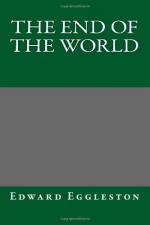Charon, the guardian of the castle, bayed his great hoarse bark at the Hawk, and with that keen insight into human nature for which dogs are so remarkable, he absolutely forbade the dandy’s entrance, until Andrew appeared at the door and called the dog away.
“I am delighted at having the opportunity of meeting a great light in literature like yourself, Mr. Anderson. Here you sit weaving, earning your bread with a manly simplicity that is truly admirable. You are like Cincinnatus at his plow. I also am a literary man.”
He really was a college graduate, though doubtless he was as much of a humbug in recitations and examinations as he had always been since. Andrew’s only reply to his assertion that he was a literary man was a rather severe and prolonged scrutiny of his oily locks, his dainty mustache, his breast-pin, his watch-seals, and finally his straps and his boots. For Andrew firmly believed that neglected hair, Byron collars, and unblackened boots were the first signs of literary taste.
“You think I dress too well,” said Humphreys with his ghastly smirk. “You think that I care too much for appearances. I do. It is a weakness of mine which comes from a residence abroad.”
These words touched the Philosopher a little. To have been abroad was the next best thing to having been a foreigner ab origine. But still he felt a little suspicious. He was superior to the popular prejudice against the mustache, but he could not endure hair-oil. “Nature,” he maintained, “made the whole beard to be worn, and Nature provides an oil for the hair. Let Nature have her way.” He was suspicious of Humphreys, not because he wore a mustache, but because he shaved the rest of his face and greased his hair. He had, besides, a little intuitive perception of the fact that a smile which breaks against the rock-bound coast of cold cheek-bones and immovable eyes is a mask. And so he determined to test the literary man. I have heard that Masonic lodges have been deceived by impostors. I have never heard that a literary man was made to believe in the genuineness of the attainments of a charlatan.
And yet Humphreys held his own well. He could talk glibly and superficially about books; he simulated considerable enthusiasm for the books which Andrew admired. His mistake and his consequent overthrow came, as always in such cases, from a desire to overdo. It was after half an hour of talking without tripping that Andrew suddenly asked: “Do you like the ever-to-be-admired Xenophanes?”




